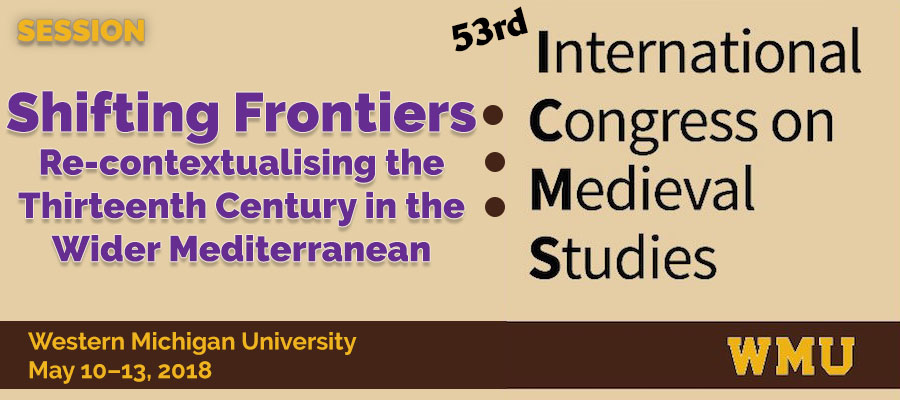Moving People, Shifting Frontiers: Re-contextualising the Thirteenth Century in the Wider Mediterranean, 53rd International Congress on Medieval Studies, Western Michigan University, May 10–13, 2018
Every day we witness people moving, with them objects and skills, knowledge and experience; either forcibly or willingly; for work or for pleasure. The communities living along the shores of the Mediterranean and the hinterlands of the Balkans during the thirteenth century share many of the characteristics of our contemporary world: military campaigns and religious wars; the intensification of pilgrimage and the relocation of refugees; the shifting of frontiers and the transformation of socio-political orders.
The transformations of the thirteenth century span from east to west, from northern Europe to the Byzantine Empire and from the Balkans to the Levant. The geographic breadth is paralleled by crucial events including the fourth crusade, the fall of Acre, the empowerment of the Serbian Kingdom and the Republic of Venice, the loss and following restoration of the Byzantine Empire, and the creation of new political entities, such as the Kingdom of Naples and that of Cyprus, the Empire of Trebizond, and the Principality of Achaia. Eclectic scholarly tradition has either focused geographically or thematically, losing sight of the pan-Mediterranean perspective. These societies had multifaceted interactions, and comprised a variety of scales, from the small world of regional and inter-regional communities to the broader Mediterranean dynamics.
This session aims to address questions such as which are the various processes through which military campaigns and religious wars affected the urban landscape of these regions and their material production? Is there a difference in economic and artistic trends between “town” and “countryside” in the thirteenth-century wider Mediterranean? What observations can we make in regards to trade, diplomatic missions, artistic interaction and exchange of the regional, interregional and international contacts? How did these shape and transform cultural identities? How did different social, political and religious groups interact with each other?
This session welcomes papers focused on, but not limited to: the role played by economic activity and political power in thirteenth-century artistic production and the shaping of local and interregional identities; the production and consumption of artefacts and their meaning; the transformation of urban and rural landscapes; religious and domestic architecture and the relationship between the private and public use of space.
Thanks to a generous grant from the Kress Foundation, funds may be available to defray travel costs of speakers in ICMA-sponsored sessions up to a maximum of $600 ($1200 for transatlantic travel). If available, the Kress funds are allocated for travel and hotel only. Speakers in ICMA sponsored sessions will be refunded only after the conference, against travel receipts.
Session organizers
Maria Alessia Rossi, Courtauld Institute of Art
Katerina Ragkou, University of Cologne
